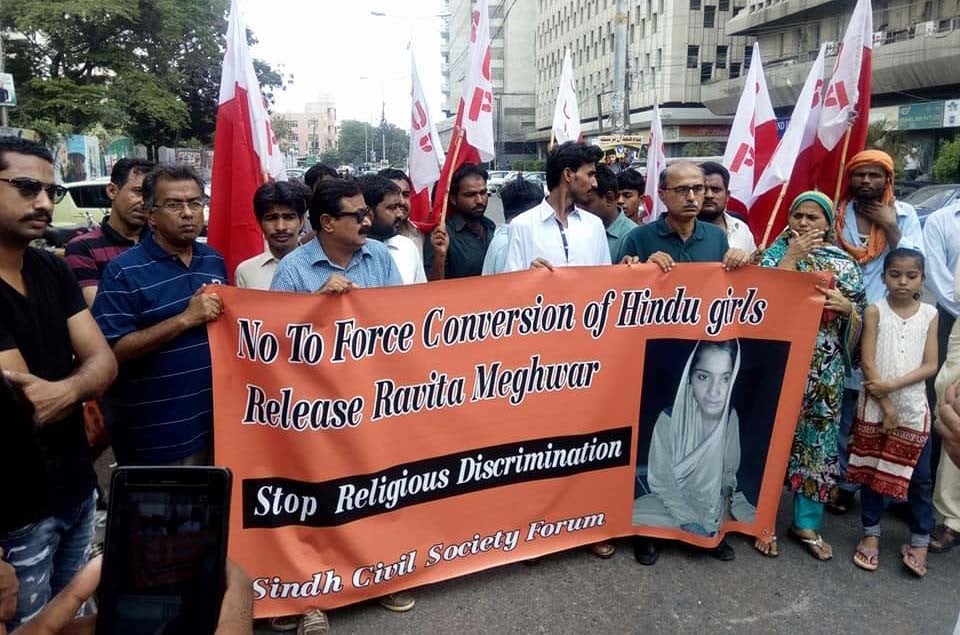
The conversion of 16-year-old girl from Hinduism to Islam has deepened the sense of insecurity among religious minorities in Sindh

The recent alleged case of abduction, forcible religious conversion and marriage of a minor Hindu girl to a Muslim man twice her age in Tharparkar district has created uproar among the minority community living in Sindh province.
The Pakistan People’s Party provincial government is being criticised for withdrawing a bill against forced conversion passed unanimously in November last year, bowing down to the pressure of religious parties.
On June 6, Ravita Meghwar, a 16-year-old Hindu girl, was abducted from a village of Nangarparkar, Tharkarpar district, and reportedly converted to Islam from Hinduism at a khanqah of spiritual leader Pir Muhammad Ayub Jan Sirhindi in Umerkot district’s Samaro Taluka. Thirty six-year-old Ali Nawaz Shah, a member of influential Syed family, has married Ravita after converting her to Islam and changing her name to Gulnaz.
Satram Das Meghwar, Ravita’s father, registered a case in local police station against Shah, claiming that her daughter had been illegally married off to Shah after having been abducted from her village. Terming marriage below the age of 18 a punishable offence under the Sindh Child Marriage Act, 2014, her father asked, "At the age of 16, she does not even understand her own religion, how can she (willingly) convert to Islam?"
Seeking protection, Shah and Ravita have also filed an application in Sindh High Court. They have accused the girl’s parents of issuing death threats. Talking to local journalists, Ravita says that she has willingly decided to convert to Islam and marry Shah.
The incident has again sent shock waves among the Hindu community, forcing them to organise protest rallies across the province, slamming the PPP Sindh government for shying away from the bill criminalising forced religious conversions and subsequent forced marriages.
On November 24, 2016, members of Sindh Assembly, setting aside their political differences and speaking in one voice, unanimously passed The Sindh Criminal Law (Protection of Minorities) Bill, making forced conversions punishable with a life sentence and forbidding minors from changing their religion, in a bid to protect minorities.
Nand Kumar Goklani, a legislator of the Pakistan Muslim League-Functional, who belongs to the Hindu community, proposed the bill in the assembly a year ago. The bill was passed on the basis of a report of the Standing Committee on Minority Affairs, which had reviewed the bill. The bill recommends five year punishment for perpetrators and three year sentence for facilitators of forceful religious conversions.
However, then Governor Sindh Justice (retd) Saeeduzzaman Siddiqui refused to ratify the bill on January 6. In his observation to the Sindh Assembly secretariat, Siddiqui (who passed away on January 11) asked to reconsider the legislation and make changes.
Sindh Assembly members, who were instrumental in passing the bill, said that the PPP’s leadership bowed to pressure from religious parties, who started protesting against the legislation after it was passed unanimously.
The religious parties from different schools of thoughts, which organised several protests and all-parties conferences, opposed the bill because it says no one under the age of 18 can convert to Islam even out of their free will. Simultaneously, several lawmakers who were involved in drafting and presenting the bill, received life threats from militant groups. An alert issued by the Special Branch advised to ensure security of lawmakers, especially Kumar, who proposed the bill, and Nisar Ahmed Khuhro, Sindh’s senior minister.
"The bill contradicts Islamic principles and violates the Pakistani Constitution," says Mufti Muhammad Naeem, principal of Jamia Binori Al-Alamia seminary in Karachi, one of the places where people convert to Islam. "Islam does not allow forced conversions, but there should be no restriction on people converting to Islam of their own free will".
In the past five years, around 600 people, including 52 foreigners, have converted to Islam at the seminary.
A number of civil society and Hindu rights activists gathered outside the Karachi Press Club on June 20 to condemn the ‘forced conversion’ of Ravita. Jesrani Birma, a Hindu rights activist, one among the protestors, says that the PPP has withdrawn the forced conversion bill in order to appease religious parties which do not have representation in the Sindh Assembly. "Political parties such as the PPP cannot endure pressure from religious parties. Now the Hindu community is demanding that the military intervene to save their daughters," Birma tells TNS.
However, PPP leaders, who are privy to the development, opine that Bilawal Bhutto Zardari, PPP Chairman, supported the bill and asked the provincial lawmakers not to bow to the pressure of religious parties. Bilawal’s acts, such as attending the Holi festival in Umerkot last year, and supporting the passing of progressive legislations, including Hindu Marriage Act, Women’s Protection Act and Child Marriage Act, were much-admired by the civil society, non-Muslim communities and progressive circles. But return of Asif Ali Zardari changed the game.
Ghazal Asif, a scholar doing research on Hindu communities in Sindh, believes that forced conversions, kidnappings and marriages has instilled a sense of insecurity among non-Muslims in the country. "There is a very clear sense of being abandoned by the state. I also think it shows very clearly that for the government, religious minorities remain second-class citizens. They are not treated the same as Muslims or given the same system of justice."
Terming PPP’s backtracking from the bill a shocking precedent, she says, "the bill was not perfect but its retraction is totally undemocratic. The provincial and national governments are not serious about protecting the millions of Hindus, Christians and other religious minorities. Perhaps, then, people are right to wonder if they are being abandoned by a partisan state held hostage by the religious right."